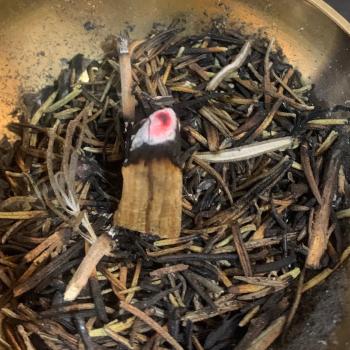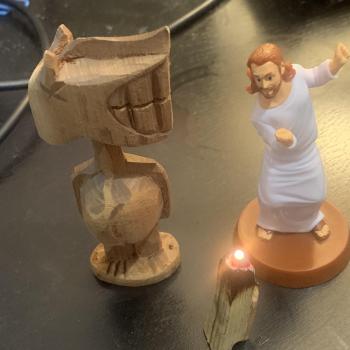Sermon preached 1/14/2012 at Burke UMC LifeSign
Text: Isaiah 6:1-8
Do you have a place that’s sacred to you? My sacred place is a lake outside of Charlottesville called Sugar Hollow. I went there every weekend when I was in college at UVA. It’s surrounded on three sides by mountains. There’s a black sand beach on which I’ve taken many naps. Whenever I go back to my favorite lake, I get a feeling in my heart as I drive up the steep hill next to the dam before the lake opens out in front of me. It always makes my jaw drop when I see the lake again, because it’s the most beautiful place in my world.
Do you have a place like that? What would you do if you went back and there were beer cans all over the ground? Or someone had sprayed graffiti onto the dam. Or a big pile of trash had been scattered by the wind across the water. Thankfully, none of this has happened at Sugar Hollow. But this sort of thing is what has happened to the concept of holiness in our world, particularly the name of God.
The third commandment God gave Moses tells us not to misuse the name of the Lord. Each time we abuse God’s name, we are trashing something sacred, like throwing a beer can into a beautiful mountain lake. God’s name is abused not only when we use it as a cuss word but also when we try to attach His name to agendas that make God look ugly. And right now, in our culture, God’s name has become about as sacred as a beautiful mountain lake in which every square inch of the water’s surface is filled with trash. This is the environment in which we pray the second line of the Lord’s Prayer, “Hallowed be thy name.”
So at first glance, it seems like a farce to say, “Hallowed be thy name.” God’s name isn’t hallowed by our world. What good does it do to engage in wishful thinking? Or is this just the proper way to address God, the religious equivalent of “Your honor” or “Your excellency”? Do we say it to kiss up to God? Your name is holy, Lord, now here’s what I want… Actually it’s none of these things. It would be completely different if we said hallowed is your name, instead of hallowed be thy name. What it means is: “God, make your name holy because the world around me doesn’t think it is.”
Now I’m going to say something that might sound a little crazy. To ask God to hallow His name is actually a very dangerous request to make. Well, only if we believe that He’s really going to do it. What if I’m part of the reason that God’s name isn’t sacred? What will happen to me when God rises up to hallow His name? What makes us assume that God is going to be gentle when He purges whatever has created disrespect for His name?
The prophet Isaiah lived in a time in Israel’s history when God’s name wasn’t respected by the people around him. That’s what he spends most of his prophecy talking about. But the Bible shares a story of a time when Isaiah saw God’s name being hallowed in the Temple. It was both a tremendously scary and profoundly beautiful experience for him. Isaiah grew up during the reign of King Uzziah, who was one of Israel’s most powerful kings. 2 Chronicles 26 tells us that Uzziah triumphed over all the surrounding nations so that the territory under his control reached as far as the border of Egypt. He had a huge army of over 300,000 men. It was a time of prosperity that Israel had not seen since the days of King Solomon.
But the problem with this prosperity was that it made Israel forget their God. Isaiah describes his people in Isaiah 2:6-8: “They are full of superstitions from the East; they practice divination like the Philistines and embrace pagan customs. Their land is full of silver and gold; there is no end to their treasures. Their land is full of horses; there is no end to their chariots. Their land is full of idols; they bow down to the work of their hands, to what their fingers have made.” Sounds a lot like our world: playing around with exotic spiritual practices, worshiping their treasure and their chariots, honoring everything except for the name of God.
To top it all off, King Uzziah committed the ultimate sacrilege. Though the king was the most powerful person in Israelite society, there was one place he could not go: the holy of holies at the center of the Jerusalem Temple. Only the priests could go there to offer sacrifices to God. Well one day Uzziah stormed into the temple. Azariah the priest tried to stop him, but he forced his way to the altar. Just as he was about to light some incense to burn, the Lord struck the king with leprosy and Uzziah was rushed out of the temple. His disease incapacitated him so that his son Jotham had to take the throne.
To Isaiah, who was born into a family of court prophets, there could not have been a greater scandal than the king’s desecration of Israel’s temple. This would have been way worse than Monica Lewinsky or even Watergate. Whether Isaiah was responding to this incident or the many other sacrileges in the culture around him, the first five chapters of his prophecy tell the story of a young man who desperately wanted to see God’s name respected by his people. Isaiah was kind of like that kid who made the video “Why I hate religion but love Jesus” that’s been viralizing around the Internet this week. He was disillusioned by the hypocrisy, and he wanted God to do something about it. And then one day, he met God face to face and it completely rocked his world. Let me tell you the story in his words: Isaiah 6:1-8.
“In the year that King Uzziah died, I saw the Lord sitting on a throne, high and lofty; and the hem of his robe filled the temple. Seraphs were in attendance above him; each had six wings: with two they covered their faces, and with two they covered their feet, and with two they flew. And one called to another and said: ‘Holy, holy, holy is the Lord of hosts; the whole earth is full of his glory.’ The pivots on the thresholds shook at the voices of those who called, and the house filled with smoke. And I said: ‘Woe is me! I am lost, for I am a man of unclean lips, and I live among a people of unclean lips; yet my eyes have seen the King, the Lord of hosts!’ Then one of the seraphs flew to me, holding a live coal that had been taken from the altar with a pair of tongs. The seraph touched my mouth with it and said: ‘Now that this has touched your lips, your guilt has departed and your sin is blotted out.’ Then I heard the voice of the Lord saying, ‘Whom shall I send, and who will go for us?’ And I said, ‘Here am I; send me!’
Isaiah doesn’t tell us what it was about the face of the one on the throne that made even the angels need to cover their faces with their wings, but their worship was so ecstatic that it caused the ground to shake and filled the air with smoke. They were literally hallowing the name of God. And it was a name that made the Earth shake. “Holy, holy, holy is the Lord of Hosts; the whole Earth is filled with His glory.” The Hebrew word that we translate as “Lord” in that sentence is YHWH, the name of God. Jewish people will not say that name aloud, so they replace it with their word for Lord, Adonai, because the name of God is too holy to use in idle speech.
When Isaiah witnessed the hallowing of the name of God, he was overcome with despair at how dirty he felt. It’s hard to explain why he felt this way since our culture has no sense of the sacred. I’m going to try describing it in terms of beauty. What Isaiah saw was so beautiful that he could not stand his own ugliness. Imagine being at an amazingly beautiful mountain lake and realizing that you are the piece of trash that keeps it from being pristine. Or having a nightmare where you find yourself at a black tie party wearing a bathrobe. That’s how Isaiah felt. He was not a bad guy. Compared to his fellow Israelites, he had his head on straight. But when you’re face to face with perfect holiness, you cannot avoid the judgment inherent in the contrast. Notice that God did not say anything angry to Isaiah. He didn’t throw lightning bolts at him. His beauty was what judged Isaiah’s ugliness.
This is important to recognize, because people in our day take the fact that God is perfectly loving to mean that God’s holiness is not anything to be concerned about. Just because God loves us infinitely doesn’t mean that His beauty will not judge our ugliness. Many of us think God is just our buddy or our Santa Claus. And so our connection with God never goes deeper than surface level; it’s just a vague sense that someone invisible cares about us. But if we want to know God, we have to face the beauty that made Isaiah feel hideous.
Isaiah needed something to happen to survive standing in the presence of God. He needed to be purified. That’s when one of the angels flew down to him, holding a red-hot coal from the altar. He singed Isaiah’s lips with the coal and told him that this act had purified Isaiah of his sin. The theological term for this kind of purification is atonement because it makes it possible to be “at one” with God. Even a prophet cannot face the holiness of God without atonement. And every single one of us needs atonement to face God.
But the holiest thing that God has ever done is what makes it possible for us to face His holiness. Through Jesus’ sacrifice on the cross, He took all of our ugliness upon Himself so that we could stop trying to hide from God’s beauty. When we accept this sacrifice on our behalf, then we can face God without shame or fear. And this is where it only becomes more dangerous. Because when we “draw near to God with a sincere heart and with the full assurance that faith brings,” as Hebrews 10:22 puts it, then we end up responding to God how Isaiah responded: Here am I; send me.
It’s one thing to go to church because it’s part of a well-balanced life, just like going to the gym and eating your greens. It’s one thing to help other people because it makes us feel good inside. But to say to God without qualification, without reservation, “Here am I; send me”? That’s dangerous and it’s the basis for the most amazing life you could possibly have. But we cannot say “Here am I; send me” with any sincerity unless we have first said “Woe is me; I am lost.” Without recognizing our inadequacy and our need of Christ’s sacrifice for our sins, we cannot truly offer our lives to God, because otherwise whatever good we do is really an effort to hallow our own names.
But if we’re willing to accept the atonement that Christ offers to us so that we can face God’s beauty without looking away, then our lives will never be our own again. We will become part of the heavenly chorus that chants, “Holy, holy, holy is the Lord of hosts; the whole earth is full of His glory.” That way we become a part of how God hallows His name and overthrows all that is ugly with His beauty.











